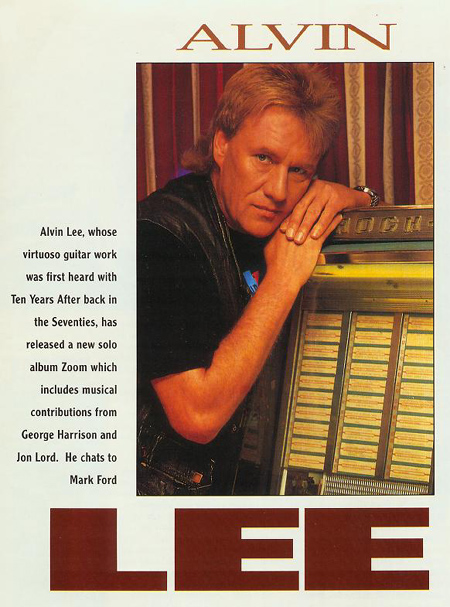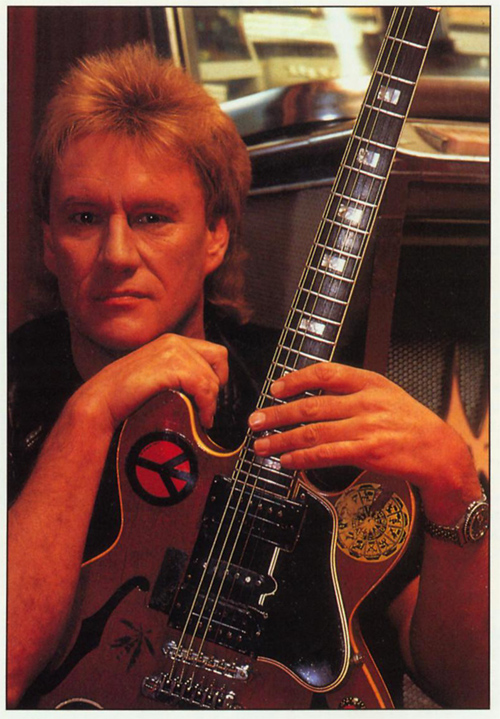|
REPLAY Magazine 1992


Alvin
Lee, whose virtuoso guitar work was first heard
with Ten Years After back in the nineteen
seventies, has just released a brand new solo
album called “Zoom”, which includes musical
contributions from George Harrison and Jon Lord.
In this article he chats with
Mark
Ford:
Alvin
Lee is in a reflective mood, in London for a day
of rare interviews, to promote his new Sequel
Records album “Zoom”, he’s reminiscing about
earlier days of rock stardom when, as front-man of
“Ten Years After” he was one of the rock
world’s most revered guitarist, playing to
audiences of many thousands, while the band’s
albums sold in their millions around the world. In
the nineteen eighties, Alvin retired to his
“rock-broker belt” mansion in Buckinghamshire,
content to let his music take a backseat. “Until
I heard Eddie Van Halen for the first time, and
his guitar work made me sit up and listen, and I
knew then that I had to start practising the
guitar again”.
The
result was a return to solo recording, with
several albums including “Free Fall, RX5 and
Detroit Diesel, and even a brief re-union with his
erstwhile Ten Years After colleagues, Ric Lee,
Chick Churchill and Leo Lyons. His new album,
“Zoom” is his first in the 90’s, and is a
great blend of goodtime blues and melodic rock
which, if there’s any justice in this world, it
should sell like hot cakes, although Alvin himself
takes more philosophical / realistic view about
it. “There was a period not that long ago, when
I went around various record companies, and was
told that they just weren’t interested in what I
was doing. I’m not expecting to get into the top
twenty, but it’s better to be an active
recording artists than someone just relying on
back catalogue sales. At least people will know
that I’m still alive” he says.
Alvin
Lee has now been a professional guitarist for more
than thirty years. In 1961, with his future Ten
Years After musical colleague Leo Lyons, Alvin
played the famous Star Club in Hamburg, Germany as
a member of “The Jay Cats” They worked on the
same bill as Liverpool’s The Big Three, Cliff
Bennett and the Rebel Rousers, Tony Sheridan who
was the big rock and roll hero of the Hamburg
scene. “The Beatles had just played there for
the first time, they wore tight
leather suits which was quite something for
the time”, Alvin recalls.
Alvin
Lee’s own interest in blues-based music had
started years before then even, “My Dad (Sam)
used to collect ethnic chain gang-type music, I
remember he once brought the famous blues singer
and guitarist, Big Bill Broonzy back to the house,
when I was about twelve years old, just sitting
there and watching him play was a big influence on
me”.
In
1965, Ric Lee teamed up with three other
Nottingham musicians to form a local band that
became the forerunner of Ten Years After. “We
started playing venues like the “Speakeasy” in
London, in fact we were signed up by Deram
Records, Decca’s Progressive rock label, after
doing a Friday residency at the old Marquee Club.
We were probably one of the first bands to start
on an albums-only-deal. It was the start of
underground music, and long guitar solos, and
musicians being able to play what they wanted to
play, and not having to think in “commercial”
terms. “Even Mike Vernon, the A & R guy who
signed us to Deram, after Decca itself had turned
down the band, said at the time, that he didn’t
quite understand what we were trying to do, but
thought that we were good?
“The
States really opened things up for the band. We
had done very well in Britain, but when the second
album, “Undead” was released in the US we got
a telegram from the top American Rock Promoter,
Bill Graham, who said that he’d like to book us
into the Fillmore West venue in San Francisco. Our
first tour of the States, in fact it lasted ten
weeks, and we lost thirty thousand pounds on it,
but it did establish Ten Years After as a working
band”.
Alvin
Lee and Ten Years After were among the bands who
played the now legendary Woodstock Festival 1969.
“Our appearance crossed us over into the mass
market, but that was mainly due to the subsequent
film of the event – “Woodstock”. We started
playing vast stadiums and a lot of people said
that it made us as a band, but it was probably the
beginning of the end, because that wasn’t what
we wanted to do. In stadiums the sound starts
getting swallowed up, and we started thinking,
“What’s the hell are we doing here? No one’s
listening anyway? “Because I came from an
underground blues music background, I always
thought of myself as being a real musician, not a
rock star, so I rebelled against it all. In
retrospect, I was very naďve…I wasn’t a
businessman, so I didn’t really grasp it all. At
a time when I could have been earning millions of
dollars, I just decided that I didn’t want to
work anymore!”.
What
particular memories does he have of Woodstock?
“They’re
very hazy, it was a long time ago, and it was the
state of me in those days anyway! To us, it was
just another big festival, but nothing too special
at the time. It was only when the film came out
that the whole event began to take on this
legendary status, there were other, better
festivals around
the same time, but they weren’t filmed for
posterity. I do remember though, that we had to
travel by helicopter in order to get through the
huge crowd that was there, and there was this
incredible smell of marijuana drifting up from
about half a million people!”.
Alvin
recorded his new album at his home studio with
guest musicians George Harrison, Alan Young, Jon
Lord and Steve Gould. “When you live on the
premises, you can choose the best time for
recording! George Harrison had been a guest
performer on my last solo album, he’s a good
mate, I just called and said, “”Any chance of
you doing a little slide guitar?” It’s like a
rock-broker belt where I live, there are so many
old rock stars with homes here!”
He
formed his own label to release the new album, and
then did a subsequent marketing and distribution
deal with Sequel / Castle. “The label was born
out of frustration, because no major record
company would commit themselves to a worldwide
release for the new album. If you sign with a
major label, they also want to own the publishing
rights, and God knows what else. All the options
are on their side. I’ve found an alternative
route to that which seems to be working well”.

|